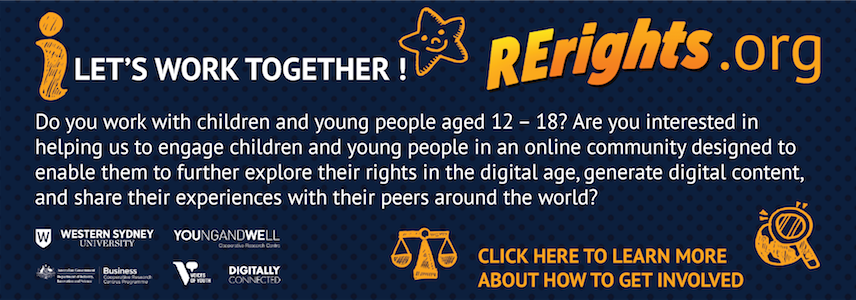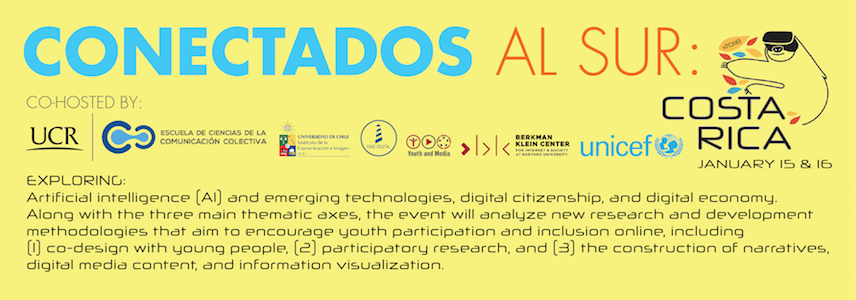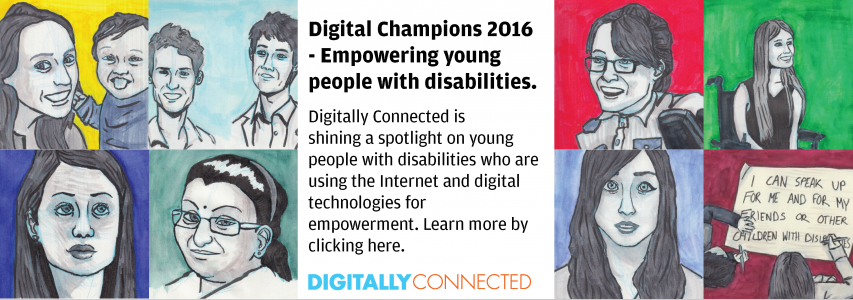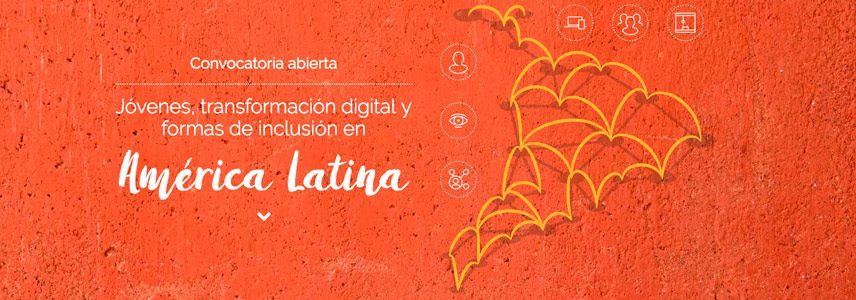Find the agenda as a PDF here.
Monday, April 28
Tuesday, April 29
Wednesday, April 30
Sunday, April 27
| 6:00 PM |
Informal Meet & GreetJohn Harvard’s Brew House 33 Dunster St, Cambridge, MA 02138 |
Monday, April 28
| 8:30 AM |
RegistrationHarvard Law School |
| 9:00-9:30 |
Welcome and Opening RemarksMartha Minow, Dean, Harvard Law School Sharad Sapra, Principal Advisor on Innovation, UNICEF |
| 9:30-9:45 |
Agenda OverviewUrs Gasser, Berkman Center for Internet & Society Gerrit Beger, UNICEF |
| 9:45-10:40 |
Interactive Opening SessionCreating A Map Of Challenges And Opportunities Related To Children, Youth, And Digital Media Around The Globe Utilizing the pre-meeting inputs from participants, the symposium will begin with an informal and interactive exercise for participants to get to know each other. Additionally, and using simple interactive tools, teams of attendees will aim to build upon, cluster, and prioritize key challenges and opportunities related to children, youth, and digital technologies around the globe, and work together to create a map of the current state of play.
Moderators: Chisenga Muyoya, Asikana Network |
| 10:40-11:00 |
BreakHarvard Law School Wasserstein Hall, Milstein East Rooms (2nd Floor) |
SEGMENT 1: KNOWLEDGE BASE — MAPPING AND DISCUSSING THE GLOBAL STATE OF RESEARCH AND PRACTICE
What do we know about children, youth, and the use of digital technologies from a national, regional, and global perspective? What is the state of research and practice, and where are the knowledge gaps? What are common findings and experiences across cultures and countries, where do we see differences, and why? Participants will present insights from large- and small-scale research projects, but also share stories of success, failure, and lessons from practice, in order to build a common foundation and work towards a global knowledge base.
| 11:00-12:15 | Keynote:Researching Children’s Rights in the Digital Age: The Challenges of a Global ApproachSonia Livingstone, EU Kids OnlineDiscussants:Nishant Shah, Centre for Internet & Society Maria Herczog, Committee on the Rights of the Child Alexandre Barbosa, TIC KidsModerator: Amanda Lenhart, Pew Research Center |
| 12:15-1:15 |
Lunch and Cluster MeetingsWasserstein Hall, Milstein East Rooms (2nd Floor)
Participants will meet over lunch in pre-assigned clusters of 8 people. These teams, which will persist throughout the symposium, will bring together individuals from around the world and be assigned opportunities for brainstorming, share ideas and information, and channel inputs back to the larger group. During this first meeting, clusters team members will gather, introduce themselves, share information, and reflect on the morning session. |
| 1:15-2:00 |
Poster Session & Project ExhibitionWasserstein Hall, Milstein West Rooms (2nd Floor)
The poster session offers participants a space to showcase highlights of their own work and progress. |
| 2:00-3:15 |
Breakout SessionsWasserstein Hall, Seminar Rooms (3rd Floor)
Participants will engage in breakout group discussions led by two co-moderators to discuss the global state of knowledge, as well as open questions, in a number of key areas ranging from methodological to substantive issues. Please sign up for these discussions in advance at http://bit.ly/DCbreakoutsignups.
|
| 3:15-3:30 |
BreakWasserstein Hall, Milstein East Rooms (2nd Floor)
|
| 3:30-4:45 | Keynote:Using ICTs to Support Child- and Youth-Related Development Work: Collective Learning From Practice and Remaining Research Needs
Wasserstein Hall, Milstein East B (2nd Floor)
Dorothea Kleine, Royal Holloway
Discussants: Chris Fabian, UNICEF Chisenga Muyoya, Asikana Network
Moderator: |
| 4:45-5:45 | Moderated Plenary:Inequality and Marginality: Recognizing Cultural Variation in the Inclusion of Children and Youth Online and in Wider Educational/Welfare Provision.Kursat Cagiltay, Middle East Technical University Indra de Lanerolle, University of the Witwatersrand Maria Mor, Trust For Américas Jack Qiu, Chinese University of Hong KongModerator: Nishant Shah, Centre for Internet & Society |
| 5:45-6:30 | Cluster Meetings & Discussion:During this cluster meeting, participants are asked to reflect on the first day. Are the issues identified an accurate representation of the state of play in various regions of the world? Were perspectives appropriately conveyed, or are there key gaps or challenges? Where are the opportunities for collaboration, communication, and synergy? Please feel free to use open space in Wasserstein Hall. |
| 6:30-8:00 |
ReceptionHarvard Law School Pub
Wasserstein Hall (1st Floor) |
| 8:00 |
Food for Thought DinnersFood for Thought dinners allow conference attendees to engage in informal, themed conversation with other conference participants. Each Food for Thought dinner has a host suggests a topic of conversation (and we welcome you to suggest and organize more than what is currently listed). Other conference attendees are encouraged to sign up for dinners to attend. Dinners are limited to eight people, including the host. We’ve made the reservations, all you have to do is show up and enjoy! Please note that attendees will pay their own dinner costs. Please sign up for these dinners in advance at http://bit.ly/DC_FFTsignups. |
Tuesday, April 29
| 8:30 AM |
Breakfast BazaarHarvard Law School
Wasserstein Hall, Milstein West Rooms (2nd Floor) 1585 Massachusetts Avenue, Cambridge, MA 02138 The poster session and project exhibition continues. |
| 9:15-9:30 |
Welcome AddressHarvard Law School
Wasserstein Hall, Milstein East Rooms (2nd Floor) Urs Gasser & Sandra Cortesi Berkman Center for Internet & Society |
| 9:30-9:45 |
Lightning TalkIsaac Mao, Social Brain Foundation |
SEGMENT 2: INTERFACE DESIGN — DISCUSSING WAYS TO IMPROVE THE INFORMATION FLOW BETWEEN EXPERTS, DECISIONS-MAKERS, AND THE PUBLIC AT LARGE
What can we learn from each other about the design of interfaces between researchers and other stakeholders in the field? In particular, what are our experiences with evidence-based policy-making across cultures and regions? How can the research community be more receptive to the needs of core constituencies, such as decision-makers? What are points of intervention and tools in our collective toolbox to improve the status quo? Utilizing the diverse perspectives of the participants and informed by reports from different countries, we will identify some of the most pressing challenges and nascent opportunities at the national, regional, and global level.
| 9:45-10:00 |
Input StatementUrs Gasser, Berkman Center |
| 10:00-11:15 |
Moderated Roundtables (Breakouts)A series of breakout sessions will focus on specific policy issues related to youth and digital media. Participants will share and discuss challenges and opportunities at the intersection of research, activism, and policy-making (both in the private and public sector). Each moderated session begins with two brief (3-4 minute) kick-off statements from invited participants. Please sign up for these discussions in advance at http://bit.ly/DC_RoundtableSignups.
|
| 11:15-11:30 |
BreakWasserstein Hall, Milstein East Rooms (2nd Floor) |
| 11:30-12:45 | Moderated Plenary:Experts, including practitioners, academics, and policymakers, who draw from their diverse regional experiences will share lessons learned about the interface (or lack thereof) between research and policy-making across different policy areas.Juan Cruz González Allonca, Dirección Nacional de Protección de Datos Personales, Ministerio de Justicia y Derechos Humanos Mike Best, Georgia Tech Jasmina Byrne, UNICEF Innocenti Research Centre Malavika Jayaram, Berkman Center for Internet & Society David Sengeh, MIT Media Lab & Global MinimumModerator: Colin Maclay, Harvard Business School |
| 12:45-1:00 |
The MAKE MovementGlobally, youth are not only consuming media, art, and knowledge—they are making it as well. And the more they make, the more they discover, the more they are engaged with their communities and the wider world. The MAKE (Media Art Knowledge Engaged) project is an open-ended experiment in transnational, collaborative workshops that support and engage youth knowledge production. In this lightning presentation, project leaders will describe their work and invite participants to join them in a working lunch and tutorial session at 1pm. |
| 1:00-2:00 |
Lunch and TutorialsWasserstein Hall, Milstein East B (2nd Floor); Tutorials in Milstein East C |
SEGMENT 3: APPLICATIONS — SHARING AND EXPLORING USE CASES FROM DIFFERENT COMMUNITIES AND GEOGRAPHIC AREAS TO DEMONSTRATE THE PROMISE, BUT ALSO THE LIMITATIONS, OF DIGITAL TECHNOLOGIES FOR CHILDREN AND YOUTH
What are case studies, experiments, and initiatives that demonstrate the promise of digital technologies for children and youth? What are their limitations? What are powerful narratives, innovative youth-driven programs, and ideas for future engagement? What is the most innovative on-the-ground work informed by practice or research on youth and digital media? What can we learn from these stories? How do these success stories relate to failures? Leveraging the collective knowledge of the participants, the symposium will not only discuss findings from research and address policy issues, but explore experimental practices that look at research and the application of knowledge through novel methods, such as youth innovation labs, maker spaces, and digital hubs that are often led by young people who are taking part in hackathons, learning to code, and incubating ideas.
| 2:00-2:15 | Lightning Talk:Social media and online communities to engage young digital citizensRene Silva, Voz Das Comunidades |
| 2:15-3:30 | Presentations & Discussion:Participants and speakers are invited to share and discuss experiences with initiatives aimed at equipping children and young people with digital skills. The session will highlight case studies and lessons learned from innovation labs, digital hubs, makers spaces, and other digital teaching and learning spaces.Andres Williamson Nasi, Microsoft Akaliza Keza Gara, Shaking Sun Jeffrey Hensley, ISOC Sarah Holland, Google Farah Pandith, Institute of Politics, Harvard Kennedy SchoolModerator: Matthew Battles, Berkman Center for Internet & Society and metaLAB (at) Harvard |
| 3:30-4:30 | Cluster Meetings: In this final cluster meeting, participants will reflect on the insights from the second day of the symposium. Are there elements that should be discussed further, emphasized, or re-conceptualized? Prepare for remarks for the Closing Panel and Synthesis Session. |
| 4:30-5:30 |
White Space / Side Meetings and MAKE SessionAt the MAKE session in the exhibition space, symposium participants can gather with the young local artists who participated in the MAKE workshops. There will be opportunity for reflection and discussion, exploring the means by which youth can engage digital media in open-ended experiential learning and experimental art-making. |
| 5:30-6:30 | Closing Panel and Synthesis:In this final session, the moderator will call upon the cluster meeting rapporteurs to share insights from their teams and invite panelists to synthesize and reflect on some of the key insights from the symposium. The session aims to outline the contours of a global roadmap for future collaboration on research and practice around children, youth, and digital media.Co-Moderators: Mary Madden, Pew Research Center Tricia Wang, Berkman Center for Internet & Society |
| 7:00 |
Informal Cocktail Conversations and Symposium DinnerLoeb House, Harvard University 17 Quincy Street, Cambridge, MA 02138 |
Wednesday, April 30
| 8:30-10:00 AM |
Food For Thought BreakfastsPlease sign up for these breakfasts in advance at http://bit.ly/DC_FFTsignups. |
| 10:00-10:30 |
UNICEF KeynoteHarvard Law School
Wasserstein Hall, Milstein East Rooms (2nd Floor) 1585 Massachusetts Avenue, Cambridge, MA 02138 Sharad Sapra, Principal Advisor on Innovation, UNICEF (TBC) |
| 10:30-12:00 |
UNICEF Activate Talks [Webcast]While the uptake of the Internet has been remarkable over the past two years, according to 2013 data from the International Telecommunications Union (ITU) the percentage of individuals using the Internet in the developing world was only 30.7% – less than half of that in the developed world. Lack of access to digital tools is even more likely among highly vulnerable groups of children and youth — young children, females, children living with disabilities, out-of-school children, unaccompanied migrant children and many others — who also struggle to access information through traditional channels, and who are most at risk of being left behind.
As part of a series of UNICEF talks focused on innovation for children and innovation for equity, the Boston Activate Talks will feature some of the most innovative approaches to increasing Internet access for underserved, marginalized, and isolated communities, with a particular focus on the benefits for children’s well-being.
The talks will be webcast live at http://talk.unicef.org. We encourage you to use the hashtag #UNICEFactivate.
Bruce Baikie, Inveneo Paulo Rogerio, Instituto Midia Etnica Regina Agyare, Soronko Solutions Susan Schorr, ITU
Moderator: |
| 12:30 PM |
Closing Remarks |
























